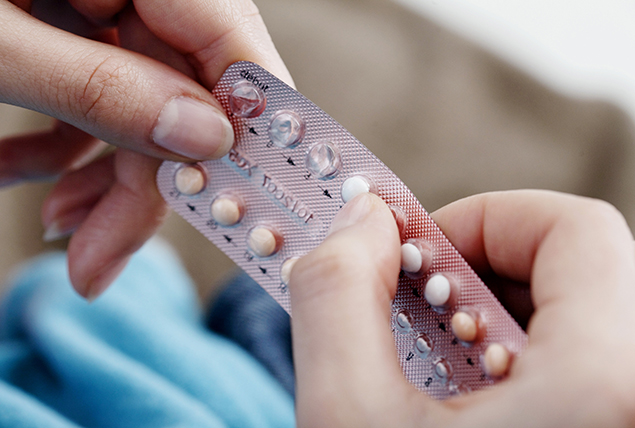Birth Control's Impact on Your Sex Life

According to the Centers for Disease Control and Prevention, 46.9 million of the 72.2 million women ages 15 to 49 in the United States used some method of contraception between 2015 and 2017, proving that many of us are taking charge of our reproductive health.
However, figuring out contraception's various potential effects on sexual function is a slightly more awkward but no less important part of the process.
Getting birth control
"When you're discussing with patients, the first thing we tend to do is ask, 'What's your goal out of this?' because that's going to determine what type of treatment you want," said Jeff Foster, M.B.Ch.B., a general practitioner in the United Kingdom with a special interest in men's health.
Finding the right birth control is akin to selecting the right partner, as it involves a little trial and error. Sometimes you luck out and strike gold the first time, but more often than not, you endure some bad dates before finding the best one.
Unfortunately, thanks to the interminable gossip mill and the lies peddled on social media, misconceptions about birth control are still going strong.
The majority of birth control has little or no effect on sexual function, however, there are some caveats.
"We tend to say to all women that when you start any form of contraceptive, you may find that it not only causes side effects, it may temporarily—but should not permanently—alter how you feel about sex," Foster said. "Generally, it tends not to do that for very long because your body settles quickly."
Impact of hormonal birth control
"Hormonal contraceptives—birth control pills, contraceptive vaginal ring and patch—contain estrogen, progesterone, or a combination of both," explained Charlotte Cremers, M.S., a general practitioner and relationship expert based in the U.K. "When these hormones enter your system, they prevent ovulation, reducing the likelihood of pregnancy."
As wonderful as these inventions are, there is a very minor risk of developing a blood clot when taking them. Anyone who is predisposed to blood clots should not take hormonal birth control, and your primary care provider should screen for these before prescribing a hormonal contraceptive.
"Blood clots reduce blood flow to various body parts, including the vaginal area," Cremers added. "This can cause female orgasmic problems. Birth control pills can also lead to low testosterone and low hormone levels, promoting low libido."
Other side effects of hormonal birth control include breast tenderness, nausea, headache, mood swings and breakthrough bleeding in between regular periods. None of these should interfere with general sexual function.
Typically, side effects settle down within a few months of taking hormonal contraception. However, if any persist or impact daily function, discuss it with your doctor or clinic to determine if a change in birth control is necessary.
Sexual impact of coils
Contraceptive coils come in two forms, the hormonal intrauterine device (IUD) and the copper IUD.
Due to the lower amount of hormone being used to protect against pregnancy, the hormonal coil should have relatively minor side effects without any impact on sexual function. The copper coil, which does not involve any hormonal interference, does not inflict any biological changes that affect sexual function.
Immediately following insertion, it can take time for the discomfort or cramps to settle down, so it's understandable if you want to avoid penetrative sex for a short time.
The only sexual impact of coils tends to be a psychologically induced one, Foster added.
"Women may feel that there is something there, and it's entirely psychological how you feel about that, just as a guy may be nervous about causing damage or injury," he said. "It's absolutely safe to have one and to have sex; it's out of the way.
Nonhormonal options
An oft-claimed—yet entirely mythical—side effect of birth control on sexual function is the belief that condoms ruin sex.
"Guys don't like the sensation of condoms," Foster said. "They feel it can ruin the magic of the moment because they have to put a sheath on top, but that's a male psychological impact. It doesn't have any real impact on your ability to enjoy sex, it's just more the hassle."
Sometimes condoms are an irritating but necessary addition to sex. No one with a penis is too big to use one, so do not listen to excuses. If a man is unable to perform while wearing a condom, then that is their responsibility to figure out, not the responsibility of the person being penetrated.
When it comes to contraceptives, safety trumps pleasure.
Healing the impact
Managing any impact on sexual function varies depending on the type of effect, so the first step is identifying the change.
If you are struggling to figure out exactly what has changed, try writing a journal to keep track of any physical, emotional or psychological changes. Once these side effects have been named, determine if a visit to the doctor is necessary.
Bring a complete medical history with a timeline so the doctor can assess whether a change in birth control is necessary or if it's a matter of waiting it out until the birth control effects settle. However, ask for a change if the side effects are too impactful to wait. It's your body, and if something doesn't feel right, it's OK to ask for a change.
For psychological side effects, such as a mental block after getting a coil inserted, remember that coils should not make penetrative sex painful or hurt a partner's penis. If the facts aren't reassuring you, take a break from penetrative sex until the fear has subsided.
If partnered sex simply feels like too much to handle alongside any side effects, take a break. Your body is the priority, and it's OK to prioritize solo masturbation while getting back in tune with its rhythm.
Communication first
When ready to have partnered sex, keep an open line of communication with sexual partners about any worries or physical realities affecting sexual function. It can be hard, and even embarrassing, but it's the best way to make sure you have a fulfilling—and safe—sex life, unmarred by any injuries, especially from vaginal dryness during penetration. Be upfront to prevent any pain or upset feelings.
If all else fails, ditch penetrative sex for a while. Pleasurable and intimate encounters can be anything you want them to be. Maybe they are purely verbal, or oral sex could take the main stage. Whatever you do, sex does not always have to center around a penis entering a vagina.


















